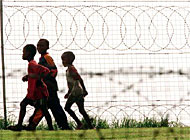Nyon opens window on South African documentary films

The works of South African filmmakers were one of the highlights at this year's International documentary film festival in Nyon. They mark the beginning of a collaboration between the Nyon and Cape Town documentary film festivals.
Of the five South African films shown at the “Visions du Réel” festival in Nyon, “The Guguletu Seven” is one of the favourites to win the international competition.
Four other documentaries, some featuring in the “Regards Neufs” series of first films, are at least partially the result of a cultural exchange programme between the Swiss Arts Council, Pro Helvetia, and “Encounters”, an annual documentary film festival in Cape town.
All but one of the South African documentaries shown in Nyon deal with the nation’s apartheid past. But they avoid preaching to the audience and manage to tell personal stories instead, approaching their subject in subtle, roundabout ways.
In “My African Mother” by Cathy Winter, white South Africans and their former black nannies dig up their memories of the intimate relationships that connected them 20 or 30 years ago.
“J.G. Strijdom Is Very Very Dead” by Pule Diphare brings together the different memories and opinions that South Africans have about Pretoria’s central square – the site of a monument to an apartheid politician that has now been turned into an African market place.
“The Lady Was a Mashoza” by Nokuthula Mazibuko is about an urban sub-culture of the 1970s in Johannesburg’s largest black township, Soweto.
The three films, as well as “The Fight”, a portrait of a boxer, were made following a weeklong workshop in Cape Town, in which prominent Swiss filmmakers assisted a selection of young South African filmmakers to refine their scripts.
“The Guguletu Seven” by renown filmmaker Lindy Wilson, a feature-length film which represents South Africa in the main competition, traces the history of a group of ANC activists who were gunned down in 1986 by police acting “in self-defence” according to an official report at the time.
The camera follows a persistent team of investigators of the Truth and Reconciliation Commission which succeeds 10 years later in unearthing the real story behind the killings.
“I think as South Africans we don’t want to be seen harping on about the past, as a matter of fact I’m dying to escape that past,” Wilson told swissinfo. “But I also think we need to know where we are coming from. My film is driven by the investigation of the truth, so it’s a cross-over from the past to the present.”
Wilson, who made documentaries during the apartheid era and occasionally had to smuggle footage out of the country, says filmmakers have a lot more freedom in the new South Africa. She says she isn’t discriminated against because she is white, but acknowledges that the reason may be that she has been an established filmmaker for many years.
Young white filmmakers could find it more difficult to start a career, Wilson says. But she supports the “huge urge to train black filmmakers”.
“We have to look to blacks to tell us new and innovative stories, because that is what will help turn South Africa into a non-racial society.”
The Swiss Development Agency (SDA) and the Swiss Arts Council, Pro Helvetia, have assisted in the training of young South African filmmakers since 1999. The two organisations sponsor annual weeklong workshops with experienced Swiss filmmakers during the South African International Documentary Film Festival, Encounters, in Cape Town.
Pule Diphare, who participated in the 1999 workshop with Swiss filmmaker Alexander Seiler, recounted the experience to a discussion forum in Nyon. “The workshop was very intense, and in my case [“J.G. Strijdom Is Very Very Dead”] the tutor [Seiler] had to prune what was only a wild idea of mine.”
The Swiss involvement in South African filmmaking aroused a great deal of interest. When the organisers of the Encounters festival advertised for the workshop with Swiss filmmakers two years ago, 105 hopefuls sent in scripts. Twelve candidates were admitted, and four films were eventually produced by e-tv, a local television network.
Documentary filmmaking is a relatively new art form in South Africa and growing quickly, Encounters director Steven Markovitz told swissinfo. But he warned against a “new political correctness” that was threatening the freedom of expression in post-apartheid South Africa.
Filmmakers who were critical of the government or of social conditions in present-day South Africa ran the risk of being attacked as “unpatriotic,” Markovitz said. “This is a lot more subtle than the outright censure of the past, but none the less dangerous for that.”
The presence of South African documentaries at this week’s Nyon festival is also a result of the Swiss-South African collaboration. Markovitz and his counterpart, Visions du Réel director Jean Perret, said they hoped to expand their cooperation, possibly to include co-productions in future.
by Markus Haefliger

In compliance with the JTI standards
More: SWI swissinfo.ch certified by the Journalism Trust Initiative









You can find an overview of ongoing debates with our journalists here . Please join us!
If you want to start a conversation about a topic raised in this article or want to report factual errors, email us at english@swissinfo.ch.